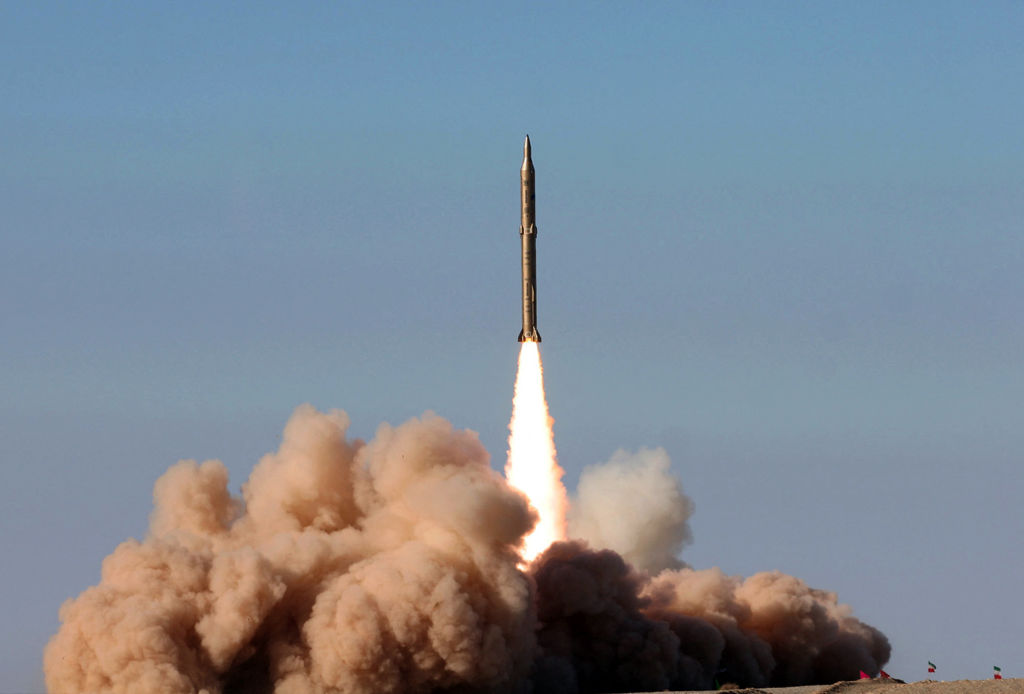Why are people so scared of ‘escalation’? The escalation paradigm is the outstanding relic of the Cold War. There is no situation where it cannot be applied. No foreign policy cause – from arming Ukraine, to antagonising Iran, to engaging diplomatically with Taiwan – can be discussed without fearing ‘escalation’. It sits among the other dud words beloved by foreign policy wonks: deterrence, compellence, persuasion, dissuasion. It is lazy, and leads to unthinking punditry. Worse still, our enemies use the escalation word-trap against us.
On 1 April, an Israeli airstrike on the Iranian consulate in Damascus killed seven Iranian officers. Everyone is on the edge of their seats. Will Iran escalate? Will Hezbollah? This is the wrong question, not least because it is what they want us to ask. A better question is: how does Iran stand to gain from the current state of affairs?
Many still wonder whether Iran is preparing to open the gates of hell.
Iran’s interests are clear: isolate Israel, keep Hezbollah intact, ensure Hamas survives. A major attack on Israel serves none of these ends. On the contrary, Iran is on track to achieving each of these goals. Any major attack on Israel would imperil those plans. It would restore Israel’s waning political capital and would threaten the infrastructure that Iran has built over the last twenty years in Lebanon and Syria. It would also put the Iranian homeland in Israel’s sights. ‘Will Iran escalate?’ immediately conjures up the worst-case scenario. ‘What might Iran do?’ forces a more thoughtful analysis.
Over the last ten years, Israel has killed over a dozen senior Iranian officers in Syria. Iran has not once responded by directly attacking Israel. In March 2022, Iran responded to the killing of two colonels in Damascus with ballistic missile strikes on a purported Israeli ‘strategic centre’ in Iraqi Kurdistan. Last December, Israel killed two Iranian brigadier generals. In early January, Israel killed the head of IRGC intelligence in Syria along with four other officers. Iran responded by bombing Erbil again as well as Idlib in Syria. The escalation paradigm elides historical detail and, in our case, has induced short-term amnesia. Once we forget how Iran tends to respond or why it would act differently this time, we become vulnerable to manipulation. The Soviets had a term for that: ‘reflexive control’.
Does anyone remember Russia’s threats to use nuclear weapons in Ukraine? This is a textbook example of ‘reflexive control’, a form of psychological warfare that uses disinformation and provocation to induce an enemy to make choices against their own interests. Its elements include ‘overload’ (large volumes of contradictory information), ‘distraction’ (a real or imaginary threat)’, and ‘splitting (convincing the enemy to act against allies’ interests)’. It is unsurprising, then, that semi-official Iranian sources would suggest that Tehran would forgo revenge if Israel unilaterally withdrew from Gaza.
The threat of ‘escalation’ is a useful tool to preserve Hamas as a viable fighting force in Gaza. International pressure on Israel is already extremely high. Despite its conservative track record, many still wonder whether Iran is preparing to open the gates of hell. Neither Hamas nor Iran can win on the battlefield. By hitting American political and material support, the pair can press for a permanent ceasefire, which serves their interests and undermines Israel’s. Over the last six months, Iran and its allies have used all manner of methods to lessen American support for Israel: targeting US bases in Iraq and Syria – to link US security to Israeli interests – and attacking international shipping – to create economic linkage – to name just two. Floating a possible war in an American election year is another part of the gambit.
For our rivals, the threat of escalation is a means. For us, de-escalation is an end in itself. Herein lies the problem. Regrettably, in an increasingly-unstable world, the most predictable thing is our lack of nerve. The escalation paradigm is a handicap on policy and thought. It ignores history and nuance. It makes us vulnerable to manipulation. And it leads us ignore thinking about the things that really matter: our interests, our leverage, and the future of an international order that we are conceding into erosion.
In his brilliant book On Strategy, Harry Summers reported a dialogue between an American and a Vietnamese colonel after the end of the Vietnam War. The American charged, ‘You know you never defeated us on the battlefield’. The North Vietnamese colonel paused before replying, ‘That may be so, but it is also irrelevant’. The threat of unwanted escalation is a form of leverage. The escalation paradigm does more harm than good.







Comments